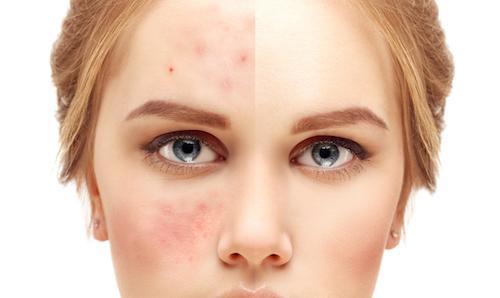Clear, radiant skin is often seen as a reflection of good health. While skincare products can make a difference, what you eat may have an even greater impact. A balanced, nutrient-rich diet can improve skin tone, reduce breakouts, and delay the visible signs of aging. On the other hand, a poor diet may lead to dullness, inflammation, acne, and premature wrinkles.
Let’s explore the connection between diet, acne, and aging — and how making smart food choices can help you achieve better skin from the inside out.
The Gut-Skin Connection
The gut and skin are more closely connected than many people realize. An imbalance in gut bacteria, caused by processed foods, sugar, and lack of fiber, can trigger inflammation throughout the body — including your skin.
This inflammation can worsen acne, rosacea, eczema, and even fine lines over time. Supporting gut health with whole foods, prebiotics, and hydration helps calm inflammation and supports a glowing complexion.
Diet and Acne: What Foods Help or Hurt?
Acne is influenced by hormones, oil production, and bacteria — but food can tip the balance for better or worse.
Foods That May Worsen Acne:
- High-glycemic foods (white bread, sugary snacks)
- Dairy products, especially skim milk
- Excess omega-6 fats (found in fried and processed foods)
- Chocolate in some individuals
These foods can spike insulin, increase oil production, and trigger inflammation, all of which can lead to clogged pores and breakouts.
Foods That Can Improve Acne:
- Omega-3 fatty acids (salmon, walnuts, chia seeds)
- Zinc-rich foods (pumpkin seeds, lentils, shellfish)
- Antioxidant-rich fruits and vegetables
- Probiotics (yogurt, kefir, kimchi)
These nutrients help reduce inflammation, fight bacteria, and support skin healing.
Diet and Aging: What Slows or Speeds It Up?
Skin aging is a natural process, but diet plays a key role in how quickly it happens. Collagen breakdown, oxidative stress, and inflammation are the primary factors behind wrinkles, sagging skin, and loss of elasticity.
Foods That Accelerate Skin Aging:
| Food/Ingredient | Effect on Skin Aging |
|---|---|
| Sugar & refined carbs | Breaks down collagen (glycation) |
| Alcohol | Dehydrates skin, increases wrinkles |
| Processed meats | High in sodium, causes puffiness |
| Trans fats | Increase inflammation |
Foods That Slow Skin Aging:
| Nutrient/Food | Benefit for Skin Aging |
|---|---|
| Vitamin C (citrus, peppers) | Boosts collagen production |
| Vitamin E (nuts, seeds) | Protects from oxidative damage |
| Healthy fats (avocados, olive oil) | Keeps skin supple and hydrated |
| Polyphenols (green tea, berries) | Fights free radicals |
By focusing on antioxidant-rich, whole foods and reducing processed items, you can preserve collagen and maintain skin firmness longer.
The Role of Hydration
Water is essential for plump, hydrated skin. Dehydration can make fine lines more visible and cause a dull, rough texture. Aim for at least 8 cups of water per day, and more if you consume caffeine or exercise frequently.
In addition to water, eating hydrating foods like cucumbers, watermelon, and leafy greens helps support moisture levels in the skin.
A Skin-Friendly Diet: What to Eat Daily
Here’s a sample table of skin-friendly food groups to include daily for clearer, healthier skin:
| Food Group | Examples | Skin Benefits |
|---|---|---|
| Healthy Fats | Avocados, olive oil, nuts | Hydration, elasticity |
| Antioxidant-Rich Veggies | Spinach, kale, sweet potatoes | Repair, UV protection |
| Lean Proteins | Chicken, tofu, legumes | Collagen support, healing |
| Low-Glycemic Carbs | Oats, quinoa, lentils | Prevents insulin spikes |
| Hydrating Fruits | Berries, watermelon, oranges | Vitamin C, hydration |
| Probiotics | Yogurt, kimchi, miso | Balances gut-skin axis |
Diet Tips for Teenagers and Adults Alike
Teenagers often struggle with acne due to hormonal changes, and adults may notice dullness, wrinkles, or pigmentation as they age. While topical treatments help, it’s just as important to eat with your skin in mind.
In fact, when building a Natural Skincare Routine for Teenage Skin, it’s crucial to pair gentle products with a diet low in sugar and dairy and rich in antioxidants and healthy fats. This inside-out approach helps regulate oil production, reduce inflammation, and prevent long-term skin damage.
FAQs: How Diet Affects Skin, Acne, and Aging
Q1: Can diet alone cure acne?
No, but it can significantly reduce its severity. A diet low in sugar, dairy, and processed foods can help decrease breakouts when combined with a consistent skincare routine.
Q2: How long does it take for diet changes to show on the skin?
Typically, you may start seeing improvements within 4–6 weeks. Skin regeneration cycles take time, so consistency is key.
Q3: Are supplements necessary for clear skin?
Not always. A balanced diet is usually enough, but supplements like zinc, omega-3s, or probiotics can help if you’re deficient.
Q4: Does drinking more water really improve skin?
Yes, hydration helps maintain elasticity and supports detoxification. However, it works best when paired with a healthy diet and proper skincare.
Q5: Are all dairy products bad for skin?
Not for everyone. Some people react to milk but can tolerate yogurt or cheese. It’s worth experimenting to see what works for your body.
Final Thoughts
Diet plays a powerful role in shaping the health, clarity, and youthfulness of your skin. While there is no single food that can fix all skin problems, a pattern of eating clean, anti-inflammatory, and nutrient-dense meals can yield long-term improvements in both acne and aging.
For teens dealing with breakouts or adults managing fine lines, pairing a well-balanced diet with the right skincare products will help you achieve healthier, more radiant skin. A glowing complexion isn’t just about what you put on your face — it’s about what you put on your plate.







